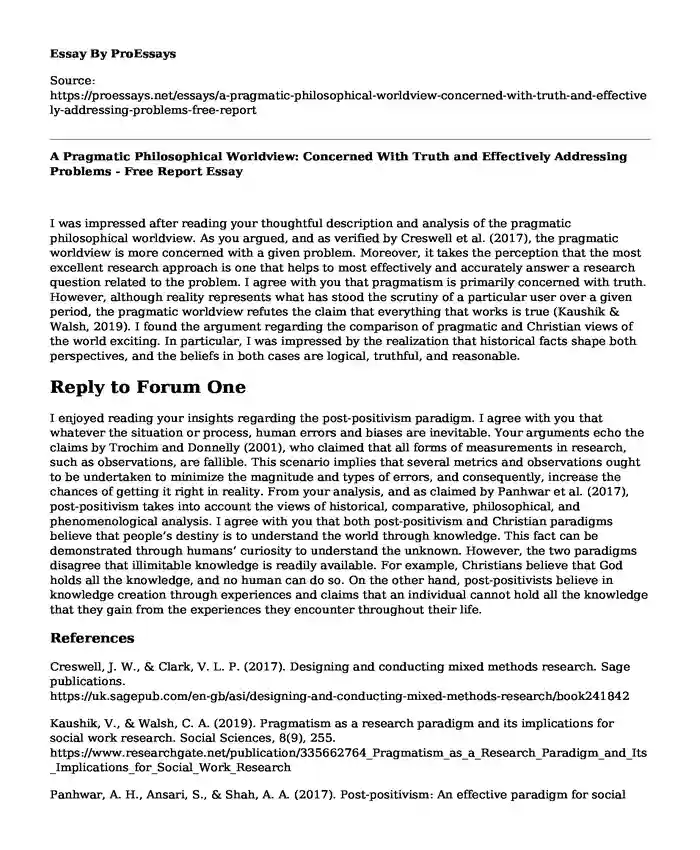I was impressed after reading your thoughtful description and analysis of the pragmatic philosophical worldview. As you argued, and as verified by Creswell et al. (2017), the pragmatic worldview is more concerned with a given problem. Moreover, it takes the perception that the most excellent research approach is one that helps to most effectively and accurately answer a research question related to the problem. I agree with you that pragmatism is primarily concerned with truth. However, although reality represents what has stood the scrutiny of a particular user over a given period, the pragmatic worldview refutes the claim that everything that works is true (Kaushik & Walsh, 2019). I found the argument regarding the comparison of pragmatic and Christian views of the world exciting. In particular, I was impressed by the realization that historical facts shape both perspectives, and the beliefs in both cases are logical, truthful, and reasonable.
Reply to Forum One
I enjoyed reading your insights regarding the post-positivism paradigm. I agree with you that whatever the situation or process, human errors and biases are inevitable. Your arguments echo the claims by Trochim and Donnelly (2001), who claimed that all forms of measurements in research, such as observations, are fallible. This scenario implies that several metrics and observations ought to be undertaken to minimize the magnitude and types of errors, and consequently, increase the chances of getting it right in reality. From your analysis, and as claimed by Panhwar et al. (2017), post-positivism takes into account the views of historical, comparative, philosophical, and phenomenological analysis. I agree with you that both post-positivism and Christian paradigms believe that people’s destiny is to understand the world through knowledge. This fact can be demonstrated through humans’ curiosity to understand the unknown. However, the two paradigms disagree that illimitable knowledge is readily available. For example, Christians believe that God holds all the knowledge, and no human can do so. On the other hand, post-positivists believe in knowledge creation through experiences and claims that an individual cannot hold all the knowledge that they gain from the experiences they encounter throughout their life.
References
Creswell, J. W., & Clark, V. L. P. (2017). Designing and conducting mixed methods research. Sage publications. https://uk.sagepub.com/en-gb/asi/designing-and-conducting-mixed-methods-research/book241842
Kaushik, V., & Walsh, C. A. (2019). Pragmatism as a research paradigm and its implications for social work research. Social Sciences, 8(9), 255. https://www.researchgate.net/publication/335662764_Pragmatism_as_a_Research_Paradigm_and_Its_Implications_for_Social_Work_Research
Panhwar, A. H., Ansari, S., & Shah, A. A. (2017). Post-positivism: An effective paradigm for social and educational research. International Research Journal of Arts & Humanities (IRJAH), 45(45). https://www.researchgate.net/publication/317605754_Post-positivism_An_Effective_Paradigm_for_Social_and_Educational_Research
Trochim, W. M., & Donnelly, J. P. (2001). Research methods knowledge base. https://conjointly.com/kb/positivism-and-post-positivism/
Cite this page
A Pragmatic Philosophical Worldview: Concerned With Truth and Effectively Addressing Problems - Free Report. (2023, Dec 11). Retrieved from https://proessays.net/essays/a-pragmatic-philosophical-worldview-concerned-with-truth-and-effectively-addressing-problems-free-report
If you are the original author of this essay and no longer wish to have it published on the ProEssays website, please click below to request its removal:
- Lost City Of Atlantis
- Reflection Essay Sample on the Treatment of Women in Islam
- Personal Values Essay Example
- Jesus of Nazareth: Messiah and Religious Leader of Christianity - Essay Sample
- Aristotle's Tragic Hero: Flawed but Godly Character - Essay Sample
- Essay Sample on Become an Exceptional Gospel Singer: Combining Impeccable Vocals & Stirring Lyrics
- Book Analysis Essay on Socrates' Apology







